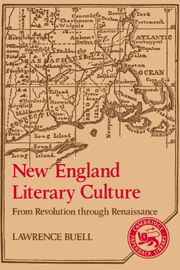Book contents
- Frontmatter
- Contents
- Acknowledgments
- Abbreviations of Frequently Cited Works
- PART I FOUR OVERVIEWS
- PART II THREE REPRESENTATIVE GENRES
- 5 New England Poetics: Emerson, Dickinson, and Others
- 6 New England Oratory from Everett to Emerson
- 7 Literary Scripturism
- PART III REINVENTING PURITANISM: THE NEW ENGLAND HISTORICAL IMAGINATION
- Part IV NEW ENGLAND AS A COUNTRY OF THE IMAGINATION: THE SPIRIT OF PLACE
- Postscript
- Appendix Vital Statistics: A Quantitative Analysis of Authorship as a Profession in New England
- Notes
- Index
7 - Literary Scripturism
Published online by Cambridge University Press: 15 October 2009
- Frontmatter
- Contents
- Acknowledgments
- Abbreviations of Frequently Cited Works
- PART I FOUR OVERVIEWS
- PART II THREE REPRESENTATIVE GENRES
- 5 New England Poetics: Emerson, Dickinson, and Others
- 6 New England Oratory from Everett to Emerson
- 7 Literary Scripturism
- PART III REINVENTING PURITANISM: THE NEW ENGLAND HISTORICAL IMAGINATION
- Part IV NEW ENGLAND AS A COUNTRY OF THE IMAGINATION: THE SPIRIT OF PLACE
- Postscript
- Appendix Vital Statistics: A Quantitative Analysis of Authorship as a Profession in New England
- Notes
- Index
Summary
The religion of one age is the literary entertainment of the next.
Ralph Waldo Emerson, “Character” (1866)If there is anything in art that can take the place of religion, we should like to see it.
Josiah Gilbert Holland, Every-Day Topics, 2nd series (1882)That American thought before 1865 was markedly religiocentric is a scholarly commonplace. Such was especially true of New England, owing to the Puritan imprint, which Enlightenment rationalism did not erase. Indeed, since the Reformation no region of the English-speaking world has probably come closer to producing a body of writing that bears out Northrop Frye's dictum that the Bible is the master text to which all Western literature may ultimately be referred. To affirm this is not necessarily to insist that religious motives were the sole or the primary determiners of human behavior even in the most pristine era of New England's settlement. Revisionist historians have argued with some cogency that the documents on which intellectual history à la Perry Miller has based its theologically oriented reconstructions of the New England mind are a “rarefied form of cognitive speculation conducted by the members of a specially trained elite” that understate the importance of other motivating factors, social and economic, even for the elite itself. This argument, however, though valuable as a corrective, is even less satisfactory as a comprehensive formulation of Puritan thought. “Compared with Americans of the 18th or the 19th century,” Daniel Boorstin commonsensically remarks, “the Puritans surely were theologyminded.”
- Type
- Chapter
- Information
- New England Literary CultureFrom Revolution through Renaissance, pp. 166 - 190Publisher: Cambridge University PressPrint publication year: 1986



